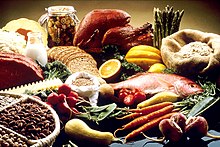A Balanced Diet for Better Health
Benefits of a Balanced Diet for Body and Mind
A balanced diet is not only important for your physical health, it also has a huge Positive impact on your mental and emotional health. Understanding the benefits of a balanced diet for the body and mind can give you more motivation to live an overall healthy lifestyle.
- Providing Essential Nutrition
A balanced diet focuses on consuming foods rich in essential nutrients such as vitamins, minerals, protein and fiber. These nutrients play an important role in maintaining optimal body functions, including the immune system, metabolism and new cell growth. - Maintain an ideal body weight
Choosing healthy, balanced foods can help you control your calorie intake and maintain a healthy weight. A stable weight not only reduces the risk of obesity and related diseases, but also improves your self-confidence and psychological well-being. - Improves concentration and memory
Healthy nutrition provides the right fuel for the brain. A balanced diet that includes complex carbohydrates, protein, healthy fats and antioxidants improves cognitive function, concentration and memory. This will help you stay focused and productive throughout the day. - Maintain hormonal balance
Balanced nutritional intake plays a role in hormonal balance in the body. This can reduce the risk of hormonal disorders such as diabetes, premenstrual syndrome (PMS), and thyroid disorders. Hormonal balance also affects your mental health and can help reduce symptoms of depression and anxiety. - Improves Mood and Mental Well-Being
A balanced diet can influence neurotransmitters in the brain, such as serotonin, which are associated with feelings of happiness and emotional well-being. Proper nutrition keeps your mood stable and reduces the risk of mood disorders such as depression and anxiety.
Why is balanced nutrition important for your health?
A balanced diet is the key to maintaining optimal health. In a busy society where fast food is often the first choice, it is important to understand why a balanced diet is so important to your health.
A balanced diet provides the fuel necessary for the body’s growth and development, especially during childhood and adolescence. Important nutrients such as protein, calcium and iron play an important role in the formation of bones, muscles and other tissues.
Proper food intake strengthens the immune system and helps the body fight infections and diseases. Vitamins and minerals such as vitamin C, vitamin D, and zinc play an important role in increasing the body’s resistance and speeding up healing.
A balanced diet supports the optimization of the function of the body’s organs and systems, including the digestive, cardiovascular and nervous systems. Healthy fats, fiber, and antioxidants maintain heart health, regulate cholesterol levels, and protect cells from oxidative damage.
A balanced diet reduces the risk of chronic diseases such as obesity, diabetes, heart disease and cancer. Eating foods that are rich in natural nutrients, low in saturated fat, and low in added sugars can help you maintain a healthy weight and control blood sugar levels.
A balanced diet not only affects your physical health, but also your mental and emotional health. Healthy foods can improve mood, reduce stress, and improve concentration and memory by providing consistent energy and regulating blood sugar levels.
A balanced diet is the foundation of optimal health. By paying attention to your intake of foods rich in essential nutrients, you can support growth, increase stamina, reduce the risk of chronic disease, and improve mental and emotional health. Start making smart, healthy food choices every day and realize the long-term benefits to your health.
How to Implement a Balanced Diet in Daily Life
Plan your menu and shop wisely: Plan your menu for a week in advance and make a shopping list based on it. This will help you choose healthy foods and avoid unhealthy shopping urges at the supermarket.
Prioritize fresh, whole foods: Choose fresh, minimally processed foods such as fruits, vegetables, whole grains and healthy proteins. Avoid processed foods that are high in saturated fat, sugar and salt.
Pay attention to the amount and frequency of your meals: Don’t skip meals, pay attention to how much you eat. Eat balanced and regular portions throughout the day to stabilize blood sugar levels and avoid overeating.
Maintain a Balanced Diet: Make sure each meal contains balanced nutrients such as protein, complex carbohydrates, healthy fats, fiber, vitamins and minerals. This will help you feel full longer and help you get the nutrients you need.
Be flexible in your diet: It’s okay to indulge in your favorite foods once in a while, even though they may not be healthy. It’s important to be flexible and take care of yourself without feeling guilty.
Listen to your body’s needs: Everyone’s nutritional needs are different. Listen to your body and notice how food affects your energy, happiness and overall health.
Drink enough water: Remember the importance of adequate hydration. Drink water regularly throughout the day and avoid sweet and high-calorie alcoholic drinks.
Prioritize family dinners: Family dinners are a great opportunity to spend time together and support healthy eating habits. If possible, schedule meal times together every day.
Make sure you have the opportunity to enjoy your favorite foods. Remember that a balanced diet is a journey, not a final destination. Be kind to yourself and always look for a balance that suits your needs and lifestyle.
A Balanced Menu for Everyone: Practical Tips and Examples
A balanced diet is key to ensuring your body receives all the nutrients it needs for optimal health and well-being. Whether you’re a busy person or just starting to eat healthier, here are some practical tips and examples to help you plan a balanced menu.
Variety is key
Choose your food. Vegetables, whole grains, healthy protein and healthy fats. Choosing a varied diet will ensure your body gets all the nutrients it needs.
Pay attention to the quantities and proportions.
Pay attention to food portion sizes and make sure each dish contains a balanced amount of nutrients. Most dishes should be filled with vegetables and fruit, with a little protein and carbohydrates.
Eat Healthy Protein
Protein is important for muscle growth and maintenance and repair of body tissue. Choose healthy proteins such as fish, lean meat, skinless poultry, eggs, nuts, and low-fat dairy products.
Contains complex carbohydrates
Complex carbohydrates provide long-lasting energy and stabilize blood sugar levels. Choose complex carbohydrates such as whole wheat bread, brown rice, quinoa, sweet potatoes, and oatmeal.
Add Healthy Fats
Healthy fats are needed to absorb certain nutrients and maintain optimal brain function. Add healthy fats like avocado, olive oil, nuts, seeds, and fatty fish like salmon and sardines.
Avoid processed foods and foods high in sugar.
Processed foods often contain added sugar, salt and unhealthy trans fats. Try to limit your intake of processed and sugary foods, choosing whole foods and minimally processed foods.
Example of a Balanced Menu
Below is an example of a balanced menu for the day.
Breakfast: Oatmeal with fresh fruit and sliced almonds.
Lunch: Vegetable salad with grilled chicken, green leafy vegetables, tomatoes, cucumbers, nuts, and balsamic vinaigrette dressing.
Snack: Apple slices with peanut butter.
Dinner: Grilled salmon fillet, baked sweet potato, and grilled vegetables (broccoli, carrots, onions, etc.).
By following these principles and making wise food choices, you can plan a balanced menu that provides the nutrients you need for optimal health and well-being. Start with small, consistent steps and reap the benefits in the long run.
Common Challenges and Solutions in Implementing a Balanced Diet
Maintaining a balanced diet can be difficult for many people, especially considering their busy lifestyles and the temptation of unhealthy foods. However, with awareness and the right strategies, these common challenges can be overcome. Common challenges and solutions to a balanced diet include:
Challenge: Busy Schedule
Busy schedules often make it difficult to plan and prepare healthy meals.
Solution: Plan and prepare your meals early in the week.
Use your weekends to plan menus and prepare big meals. Storing food in easy-to-reach containers allows you to quickly access healthy foods even when you’re busy.
Challenge: Not having time to eat properly
Sometimes we don’t have time to eat properly or we forget to eat properly.
Solution: Bring Snacks
When traveling, bring healthy snacks like fruit, nuts, and Greek yogurt. That way, you can avoid the temptation to eat unhealthy fast food.
Challenge: Craving Fast Food
Fast food is often more available and affordable, but often less healthy.
Solution: Look for healthy alternatives.
Look for restaurants and grocery stores that serve healthy foods. When eating out, pay attention to the menu and choose foods that are low in fat, low in sugar, and high in fiber.
Challenge: Overcoming Old Habits
Changing deep-rooted eating habits can be difficult.
Solution: Support yourself
Take time and patience to adapt to change. Don’t blame yourself too much if something goes wrong. But still focus on the goal of eating a balanced diet.
Challenge: Resist the Temptation of Favorite Foods
Avoiding the temptation of unhealthy favorite foods is difficult.
Solution: Be Flexible
Enjoying your favorite foods occasionally is fine, as long as they are consumed wisely and in the right amounts. Remember that balance and long-term consistency are more important than perfection all the time.




